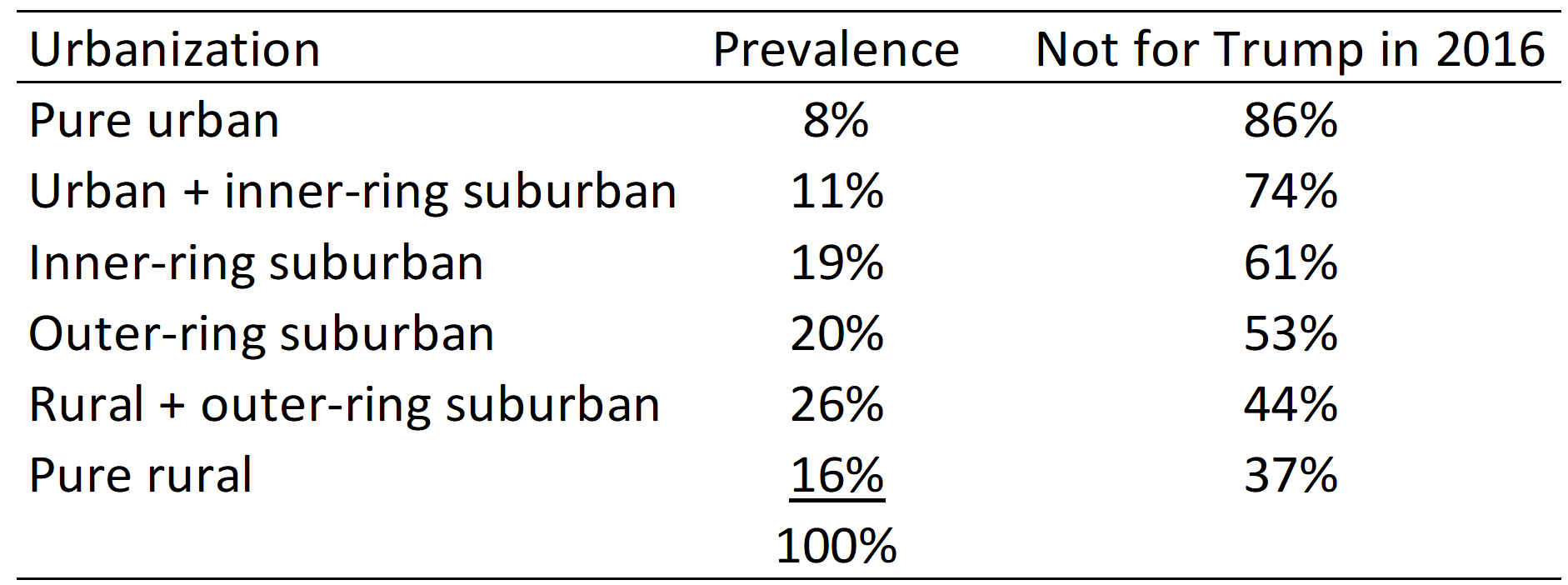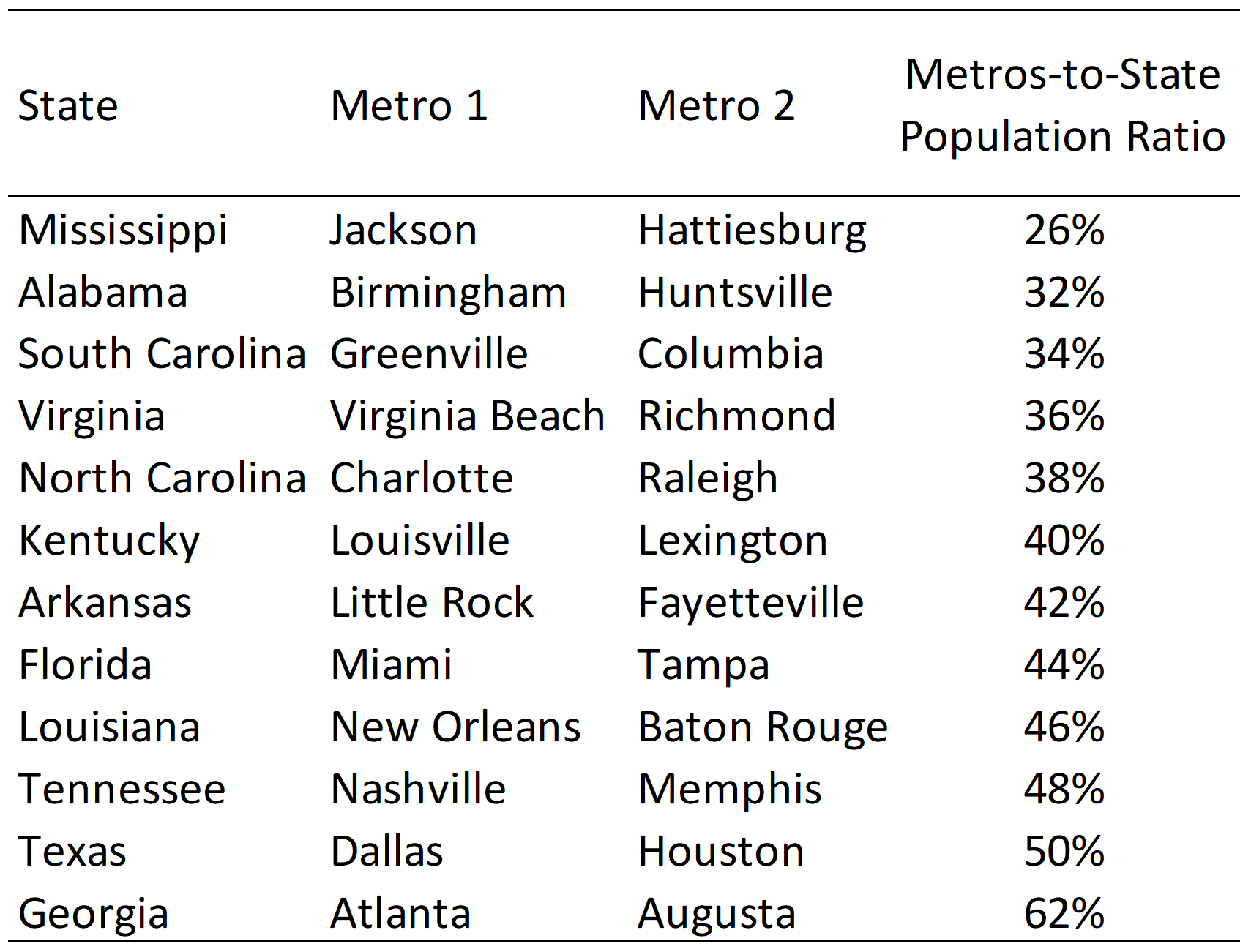Resettling for Freedom Will Work Best in Jackson, Mississippi and Birmingham, Alabama
Resettle where the Progressive metro areas contain the smallest fraction of the population, choose the largest metro areas’ largest cities, and help neighborhoods in these cities become self-determining neighborhood cities.
James Anthony
April 16, 2021 published
July 12, 2021 updated title, Table 3, and text about Table 3
Increasingly, people who love freedom are considering moving in large numbers to places where they can transform local and state governments to make life, liberty, and property secure from all governments [1].
Choosing where to spend decades of life based on a place’s current elected representatives would be building on shifting sand. To build on a solid foundation requires understanding the comparative dominance of the key Progressive areas.
The key Progressive areas are the urban cores [2], Table 1.
Table 1. Voting vs. Level of Urbanization

In urban and inner-ring suburban neighborhoods, the most-Progressive candidates almost always win majorities.
And currently these Progressive majorities’ control and impact is further solidified in every metro area by forcing the people who live in many very-different neighborhoods to live under a very few one-size-fits-all big governments.
Helpfully, urbanization trends vary substantially between regions [3], Table 2.
Table 2. Urbanization Growth Rates
(100 Largest Cities, 1990-2000)

The constitutionalist outer rings are outgrowing the Progressive inner cores fastest in the South.
The Southern states vary considerably in how much of the state’s population is contained in the state’s two largest, and therefore most-Progressive, metro areas, Table 3.
Table 3. Southern-State Metro Population Ratios
(2019 Estimates)

The most-constitutionalist states to resettle in are Mississippi and Alabama.
The most-important cities to resettle in to keep these states constitutionalist are Jackson and Birmingham.
And it’s none too soon to start helping neighborhoods in Jackson, population 594,000, or in Birmingham, population 209,000, become better-individuated, self-determining neighborhood cities [4].
References
- Anthony, James. “Local Governments with Good Boundaries Build Freedom.” rConstitution.us, 29 Jan. 2021, rconstitution.us/local-governments-with-good-boundaries-build-freedom/. Accessed 16 Apr. 2021.
- Florida, Richard, and David Montgomery. “How the Suburbs Will Swing the Midterm Election.” Bloomberg CityLab, 5 Oct. 2018, www.bloomberg.com/news/articles/2018-10-05/the-suburbs-are-the-midterm-election-battleground. Accessed 26 Dec. 2020.
- Berube, Alan, and Benjamin Forman. “Living on the Edge: Decentralization within Cities in the 1990s.” Brookings, 4 Oct. 2002, www.brookings.edu/wp-content/uploads/2016/06/berubeformanedge.pdf#page=10. Accessed 16 Apr. 2021.
- Anthony, James. “Neighborhood Cities Increase Freedom.” rConstitution.us, 26 Dec. 2020, rconstitution.us/neighborhood-cities-increase-freedom/. Accessed 16 Apr. 2021.
James Anthony is the author of The Constitution Needs a Good Party and rConstitution Papers and has written articles in The Federalist, Foundation for Economic Education, American Thinker, American Greatness, and rConstitution.us. Mr. Anthony is a chemical engineer with a master’s in mechanical engineering, and lives in St. Peters, Missouri (but has family near Greenville, South Carolina).
Commenting
- Be respectful.
- Say what you mean.
Provide data. Don’t say something’s wrong without providing data. Do explain what’s right and provide data. It’s been said that often differences in opinion between smart people are differences in data, and the guy with the best data wins. link But when a writer provides data, the writer and the readers all win. Don’t leave readers guessing unless they go to links or references. - Credit sources.
Provide links or references to credit data sources and to offer leads.